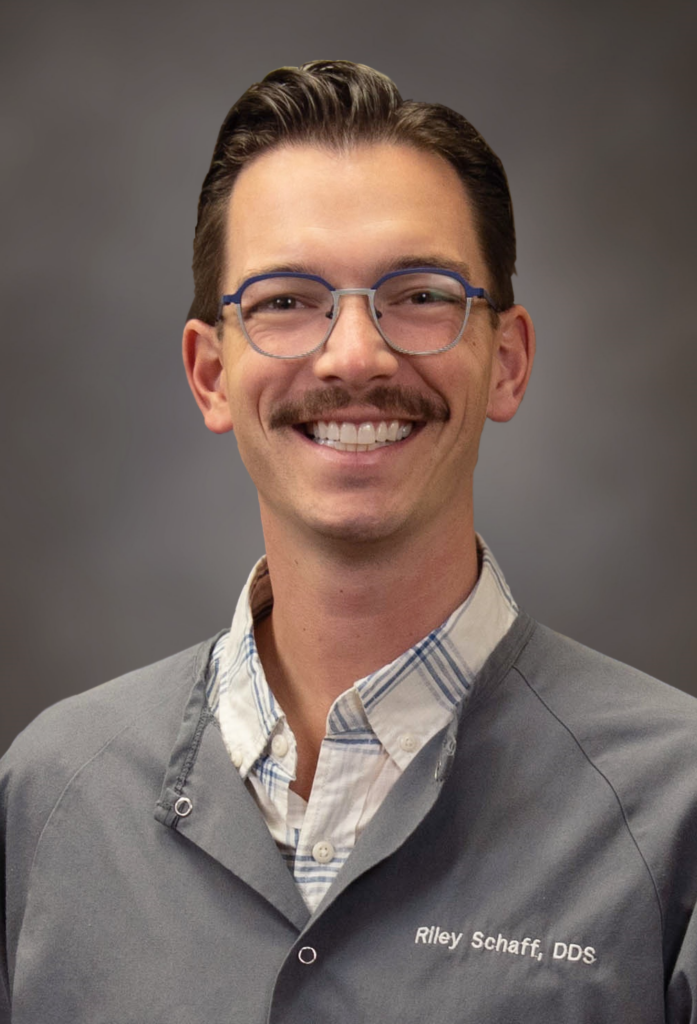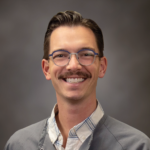Alumni Profile Q&A: Dr. Riley Schaff – Already contributing leadership to the profession early in his career8 min read
____________________________
This profile is one in an ongoing series highlighting School of Dentistry alumni, faculty and students.
____________________________

Dr. Riley Schaff, a 2017 DDS grad of the U-M School of Dentistry, practices in Ann Arbor and Jackson, and is an adjunct faculty member at the dental school. If most early-career dentists initially focus mostly on getting their career and practice up and running, Dr. Schaff is taking a different approach. Even before graduating from dental school, he engaged with professional dentistry initiatives and organizations, and has continued that commitment over the last seven years he has practiced since finishing a post-DDS General Practice Residency in Seattle, Washington. In April, the Michigan Dental Association recognized his early-career service to the profession with two awards – the Dr. Matt Uday New Dentist Leadership Award and the annual Dental Faculty Award for U-M. During a recent interview at the Ann Arbor office of Oak Valley Dental Associates, where he is a partner with Dr. Dan Edwards (U-M DDS 1997), Dr. Schaff discussed how he became interested in dentistry, the satisfaction of the profession and the need to be involved in ensuring high standards for the profession now and into the future.
Q: How did you become interested in dentistry?
A: I grew up in Jackson, Michigan, where my Dad was optometrist. His work drew me into the idea of healthcare. I liked his sense of community and the relationship-building that he had with patients throughout his career. In high school, I looked at the broader healthcare system, like medical school, and also education outside of healthcare. But the turning point for me came as a high school junior during a visit to my family dentist, Dr. Robert Rando, for a routine cleaning. He was asking me all the standard questions for my age, like: Have you thought about what you are going to do for a career? And he told me, ‘I think you should come shadow me for a couple of days this summer and see what you think.’ So I did that. And the very first time I was there, he pulled out his dental anatomy textbook and had me carve an incisor out of balsa foam using some of his waxing instruments. And I just thought that was the coolest thing ever. I loved the idea of working with my hands. From that point, I began to focus on dentistry – the patient-building, the rapport that comes with those relationships, and being able to make a difference in somebody’s life. As I spent more time shadowing in dentistry, both at Rob’s office and also all through college in various clinical settings, that’s more and more what grew on me. During my undergrad at U-M, I was in the pre-dent group and an upperclassman said I should shadow Hospital Dentistry. That was a very eye-opening experience, with all the surgery and variety of patient cases. I realized more about the variety that exists within dentistry and how many different things you could do with a dental degree. That period where I was in the hospital clinic was when I knew for sure that dentistry was what I wanted to do.
Q: And you still have a tie with Dr. Rando.
A: When I moved back to Ann Arbor after my General Practice Residency in Seattle, I began working halftime with Rob and halftime at Oak Valley Dental. Now it’s just one day a week with Rob, but I’ve been working with him for the last seven years. It’s been such a nice connection to be in my hometown, and he’s really the one that got me into dentistry in the first place.
Q: What do you tell prospective dental students and others about your time at the U-M dental school, with its longstanding reputation for excellence?
A: Sometimes I hear people say they’re not sure they would do dental school again, but I would do it all over and over again. It was difficult, there were the typical pain points of the academics and clinic work. But it was very professionally rewarding and I made a lot of great friends along the way. I made good connections with people I can call anytime with questions. Excellence is a mindset. Going through school, you hear all these names that are synonymous with excellent dentistry. You think of (Sigurd) Ramfjord, the world-class periodontist. Every orthodontist knows who (Professor Emeritus) Jim McNamara is and about his ortho research and expertise. It’s all part of the very storied history at the university. I don’t know if I appreciated that entirely when I was in school. When it really struck me was when I did my GPR and was surrounded by other highly capable new dentists, but it was very clear that we had been through very different educational paths, despite the abilities that we each possessed. To come from this program, Michigan is a very unique institution and it definitely puts it graduates far ahead of others.
Q: Your CV already has an impressive list of volunteer activities for dentistry and the U-M dental school. To name just a few, you’ve served on the MDA Insurance and Financial Group Committee on Endorsed Services; chair of the MDA New Dentist Committee; member of the MDA’s Dental Political Action Committee Board of Governors; past graduate of the MDA’s Leadership Exploration and Development (LEAD) program; Michigan delegate to the American Dental Association House of Delegates; the ADA Council on Communication; and current president of the Washtenaw District Dental Society. At the dental school, you are an adjunct professor in the Department of Cariology, Restorative Sciences and Endodontics; a member of the school’s Alumni Board of Governors; and among the alumni joining with the new Look to Michigan Campaign to brainstorm future needs and fund-raising strategies for the school. Why are you so engaged?
A: Part of it is that when I was in dental school I got involved with the American Student Dental Association. Even before that, as a pre-dental student, I was exposed to the ASDA campus chapter. One of the things that stuck with me early in my dental education was the whole advocacy piece of the puzzle. Professional organizations and organized dentistry exist for so many different reasons, but when you get down to it, it is our professional voice in what we do day to day. When we all can say, yes, this is what dentistry should be, this is the direction that we want the profession to be going in over the next 30 years, that’s important. Early in dental school, I went to Lobby Days and other things where I got to see advocacy in action. I loved that side of things, learning about all the other things that organized dentistry has to offer. The biggest thing for me, particularly early in my career, is the relationships I’ve built. In dental school, Drs. Joe Kolling and Dan Edwards were my mentors, and I got to know their practice partner Deb Lisull through MDA activities. Even before they asked me to join their practice, I could see that they were all highly involved in professional dentistry organizations. It was easy to see how their connection to the profession led to their clinical excellence and how their many professional relationships were rewarding and beneficial to their careers.
Q: Similarly, why keep in touch with the dental school, both with teaching and various volunteer commitments.
A: It’s been very good. I like doing those types of things. I’m here in Ann Arbor, so it makes it very convenient to stay involved in the dental school. Also, I find so much value in staying plugged in there. I have so many colleagues, full- and part-time faculty, people who I appreciate having relationships with. People who I can call on when I need something, people I get to see out and about at various conferences and other events. And being plugged in there is a different energy. The students provide a different energy than what I get day to day in my practice. The ability to stay involved in what they are being taught, the latest and greatest info about treatments and equipment – those things absolutely influence my clinical practice. So to do these little things to help maintain that dental school community, as well as contribute to where the profession will be in 30 years, is a really important thing.
###
The University of Michigan School of Dentistry is one of the nation’s leading dental schools engaged in oral healthcare education, research, patient care and community service. General dental care clinics and specialty clinics providing advanced treatment enable the school to offer dental services and programs to patients throughout Michigan. Classroom and clinic instruction prepare future dentists, dental specialists and dental hygienists for practice in private offices, hospitals, academia and public agencies. Research seeks to discover and apply new knowledge that can help patients worldwide. For more information about the School of Dentistry, visit us on the Web at: www.dent.umich.edu. Email: [email protected], or (734) 615-1971.

